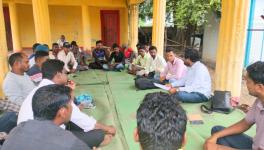Scrapping of Roshini Scheme Disappoints Bakarwals from Jammu
PC : Avinash Sourav
In 2010, Mohammad Ramzan* (name changed to protect identity), a Bakarwal from Kalakot, Jammu, filed an application to get the ownership of the land that he and his ancestors have been occupying for years. Ramzan is one of the thousands of aspirants who are supposed to get ownership of the land under Jammu and Kashmir State Lands Vesting of Ownership to the Occupants Act, 2001, popularly known as the Roshini Act. Ramzan says that he was hopeful that he will have a land of his own until State Administrative Council (SAC) headed by J&K Governor Satya Pal Malik repealed the Roshini scheme. On November 28, 2018, the SAC annulled the scheme, saying that it “failed to realise the desired objectives and there were also reports of misuse of some of its provisions”.
As per the government’s order, all the pending applications for transfer of ownership to the new occupants have been cancelled. “All pending proceedings under the Act shall stand cancelled immediately and abate.,” the official release said. However, those cases where the rights have been transferred stand valid. Ramzan’s application was one of them. “My application had been pending since last seven years. My ancestors have been occupying the land, and I was happy my family will own the land now. We are Bakarwals, and we are always on the move. But this scheme for us was like a ray of light in the dark tunnel. In summers, we go uphill to Gurez, and in summers, we come to Kalakot, and stay here for six months,” says Ramzan who has installed a tent on the hillock in Kalakot.
The scrapping of Roshini Act has worried the Gujjar-Bakarwal community, who are state’s landless tribal community. The central act, The Forest Right Act, 2006, has not been extended to the state of Jammu and Kashmir, as the state is granted special status accorded to it by Article 370 of the Indian Constitution.
What is Roshini Act?
In 2001, Roshini Act was enacted by the then Ghulam Nabi Azad-led Congress-PDP coalition government. The act was envisioned to fulfil twin objectives of “generating resources for financing power projects and conferment of proprietary rights to the occupants of the of the state land”. By granting ownership of the state land to its occupants, subject to a fee decided by the government, the aim was to generate funds to finance power projects in the state, hence the name Roshini.
Initially, when the Act was passed, the government had estimated granting of ownership of around 20.55 lakh kanals (1,02,750 hectares) to the occupants, of which, nearly 15.85 per cent land was approved for vesting of ownership rights. The rules of the Act were amended in 2004 and 2007 by the successive governments. The rules prescribed “the types of state lands on which ownership rights could be transferred to occupants on applications to be considered by committees to be set up for this purpose, which were also empowered to determine the market value of the land”.
Irregularities in the Act
The scheme was seen as a revolutionary measure, but not for long, as the allegations of corruption and nepotism weighed heavily on the scheme. According to the report by the Comptroller and Audit General of India, 2014, “The government had estimated (November 2006) that total State land was 125,03,973 kanals of which 20,64972 kanals (estimated value Rs 25,448 crore) was under encroachment.” The report underlined “irregularities” in granting the ownership of the land to its occupants.
The report noted the transfer of agricultural lands “free-of-cost” against the provisions of the Act. “Hence, all the transfers of agricultural lands under the Act become illegal,” reads the report.
In its conclusion, the report reads, “It was observed that only Rs 76.24 crore (24 per cent) reportedly realized against a demand of Rs 317.54 crore raised by the end of March 2013 in the actual transfer of 3,48,160 kanals in the state. Thus, the principal objective of the Act, viz., raising of resources for investment in Power Sector was not achieved though the State has lost sizeable land.” The Roshini scheme had failed to achieve expected revenue, thereby, failing to achieve the objective.
Get the latest reports & analysis with people's perspective on Protests, movements & deep analytical videos, discussions of the current affairs in your Telegram app. Subscribe to NewsClick's Telegram channel & get Real-Time updates on stories, as they get published on our website.
























